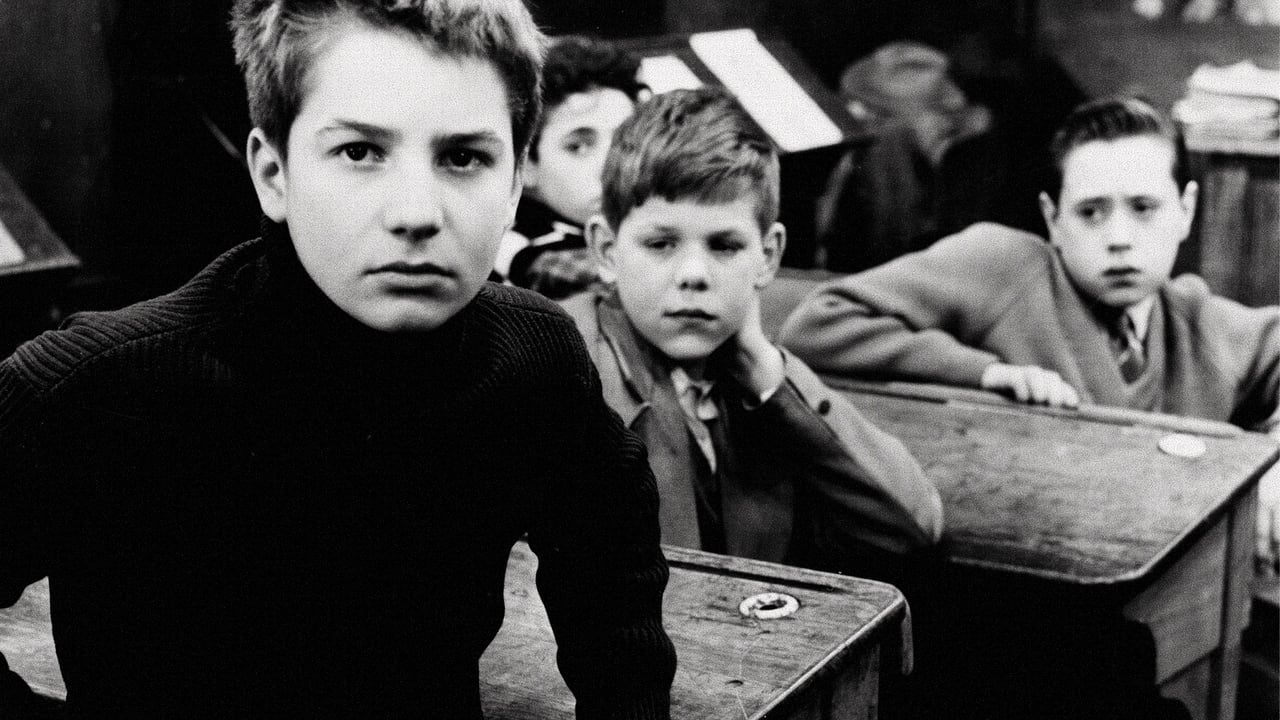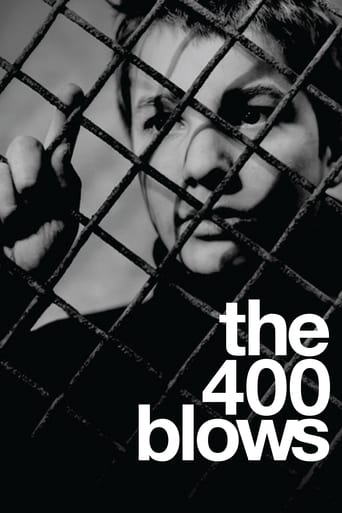Steinesongo
Too many fans seem to be blown away
Inadvands
Boring, over-political, tech fuzed mess
MoPoshy
Absolutely brilliant
Stoutor
It's not great by any means, but it's a pretty good movie that didn't leave me filled with regret for investing time in it.
adonis98-743-186503
A young boy, left without attention, delves into a life of petty crime. The 400 Blows or also known as 'Les Quatre Cents Coups' is once again another movie that never reaches whatever potential it could reach but also wastes it's time with a character that wasn't much interesting to begin with and as i have reached slowly the end of the Top 250 i find myself disappointed with the movies that IMDb has selected to put on their list unlike some truly amazing movies that truly have big potentials as a whole and we get movies like this for some reason. (0/10)
Anssi Vartiainen
One of the defining films of its director François Truffaut as well as the French New Wave movement. The latter was a loose term joining together a group of mid-century French film makers that took upon as their goal to talk about current subjects, to experiment with the film medium and to ground it in reality through real locations and modern subject matters.And keeping that in mind, it's easy to see why this film become such a cornerstone for them. It tells about a young Parisian school boy Antoine Doinel (Jean-Pierre Léaud), who struggles in every area of his life. His parents heap both scorn and misunderstandings upon him, his school work barely passes muster, and he spends most of his days partaking in minor crimes and misdemeanours. The film doesn't really have a traditional story arc. Doinel doesn't learn that much, his circumstances don't really change. Rather the whole film has the atmosphere of the inevitable in it as Doinel's life slowly spirals deeper and deeper into ruin, culminating in the last haunting shot of him staring directly into the camera on a deserted beach, silently crying for rescue.And yes, the film has a rather gruff feel. It seems like they simply set up the camera, shot the scene and excited the room. Which of course is the ideal of New Wave, but takes some getting used to from a viewer more familiar with mainstream film media.Still, it's a beautiful film in its own way. Personally I appreciate the ideal it represents more than I appreciate it as a stand-alone film, but I'm still glad I saw it.
elvircorhodzic
THE 400 BLOWS is a French drama about childhood and growing up under very difficult family and social circumstances. The main protagonist is a boy, who was faced with a lack of understanding by his own family and teachers at school. His French teacher is the embodiment of terror and incomprehension. His mother and stepfather, because of work and irregular life, do not have time for her only son. The boy began to run away from home and deal with petty crimes...The story is incredibly realistic, clear and honest. Deviation from the traditional narrative is more than obvious. Mr. Truffaut has introduced realistic social and family situations. These situations have offered insight into one emotional confusion and painful agony. It is difficult to describe with words. The boy leads an inner struggle, that moves him away from the school and parents. The story contains some of the director's autobiographical moments and intimate experiences from his youth. Because of that, an image of Paris and a musical score are quite sad. Certain critiques of education or perhaps social incompetence is the point of this movie. Jean-Pierre Léaud as Antoine Doinel is a realistic and simple character. The boy, who does not provoke sympathy. A vulnerability and naivety of his character are amazing. His honesty, while a psychiatrist attempts to fathom reasons for his discontent is almost heartbreaking. His support is Patrick Auffay (René Bigey) as his best friend and accomplice in the crime.Claire Maurier as Gilberte Doinel is quite superficial and deceptive character in the role of Antoine's mother. Albert Rémy as Julien Doinel is a confused and unfulfilled Antoine's stepfather. Guy Decomble as Sourpuss He is an indifferent and insensitive teacher.This is a small and very interesting masterpiece. Very important drop in the French New Wave.
Takethispunch
a young boy growing up in Paris during the 1950s. Misunderstood at home by his parents for wagging school and stealing things and tormented in school for discipline problems by his teacher (Guy Decomble) (Antoine falsely explains his being away from school was due to his mother's death), Antoine frequently runs away from both places. The boy finally quits school after being caught plagiarizing Balzac by his teacher. He steals a typewriter from his stepfather's (Albert Remy) work place to finance his plans to leave home, but is apprehended while trying to return it.Antoine Doinel in the final scene The stepfather turns Antoine over to the police and Antoine spends the night in jail, sharing a cell with prostitutes and thieves. During an interview with the judge, Antoine's mother confesses that her husband is not Antoine's biological father. Antoine is placed in an observation center for troubled youths near the seashore (as per his mother's wishes). A psychologist at the center probes reasons for Antoine's unhappiness, which the youth reveals in a fragmented series of monologues.

